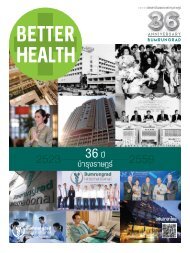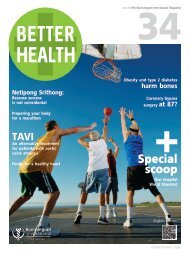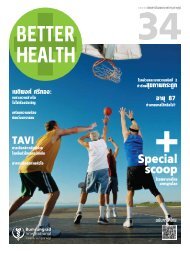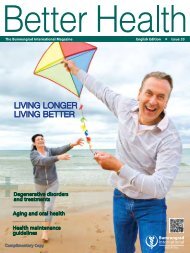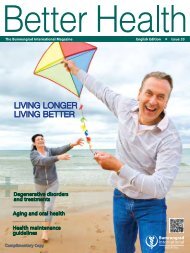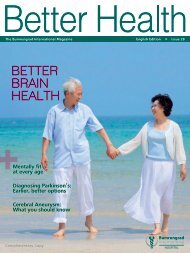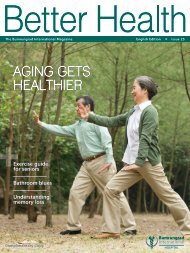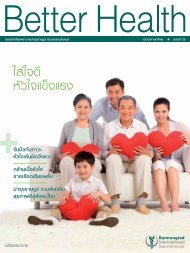All pdf BH Issue 33 Eng
Create successful ePaper yourself
Turn your PDF publications into a flip-book with our unique Google optimized e-Paper software.
DEGENERATIVE DISORDERS<br />
Health problems of<br />
the older person<br />
Armed with proper knowledge about what health<br />
changes to expect in older age, along with proper<br />
prevention, care, and planning, older persons can<br />
live longer and healthier lives.<br />
As people age, tissues and organs deteriorate, causing<br />
inevitable health problems. Knowing what to expect<br />
and how to take action in preventing or minimizing<br />
problems leads to overall better health in the senior years.<br />
“We divide geriatric health problems into two major<br />
groups,” says Dr. Lily Chaisompong, who specializes in<br />
geriatric medicine at the New Life Healthy Aging Clinic.<br />
“The first comprises common diseases that may be found<br />
at the younger ages such as diabetes, high blood pressure,<br />
heart disease, and kidney diseases, but that can become<br />
more serious and complicated with age. The second group<br />
comprises age-related geriatric syndromes, which can<br />
decrease a senior’s self-care ability.<br />
Geriatric syndromes:<br />
1. Confusion and amnesia<br />
Memory loss and slower thinking<br />
come with age. However, acute<br />
health problems such as infections,<br />
heart, or brain conditions can<br />
trigger mental disorientation and<br />
confusion. Finding and treating<br />
the underlying illnesses usually<br />
brings the changes back to normal.<br />
However, a more gradual and<br />
insidious change in an older person’s<br />
mood, behavior, or memory may signal the onset of dementia.<br />
The warning signs of dementia include difficulty learning<br />
or remembering new things, repeating words or questions,<br />
the inability to perform complicated tasks, getting lost or<br />
forgetting familiar places, no interest in socializing, speaking<br />
less, and a change of habits.<br />
Alzheimer’s disease is the most common cause of<br />
dementia, but others include stroke, Parkinson’s disease,<br />
hypothyroidism, and vitamin B12 deficiency.<br />
Prevention and care<br />
Consult with a doctor if the patient exhibits changes in<br />
thinking and memory that impact daily life. Dementia is<br />
incurable, but brain-stimulating activities such as doing<br />
light household chores, socializing with friends and family,<br />
reading, playing mental games such as crossword puzzles,<br />
and physical exercise can help to slow its progression.<br />
2. Osteoporosis<br />
Osteoporosis, a silent and insidious<br />
disease that causes loss of bone<br />
mass and makes bones brittle,<br />
shows no early symptoms. Patients<br />
generally only become aware of<br />
it if they happen to fall and suffer<br />
bone fractures. Postmenopausal<br />
women and men of over 70 years<br />
of age are particularly at risk.<br />
Prevention and care<br />
Women over 55 and men over 70 should get tested<br />
for bone mineral density (BMD), which indicates the<br />
density of bone mass in comparison to its normal ratio<br />
in younger adults.<br />
Vitamin D helps the body absorb calcium. Get tested for<br />
a deficiency, and if found, take vitamin D supplements.<br />
Ingest foods high in calcium or supplements of 1,000<br />
milligrams per day.<br />
Practice weight-bearing exercises such as walking, running,<br />
or lifting light weights.<br />
8



